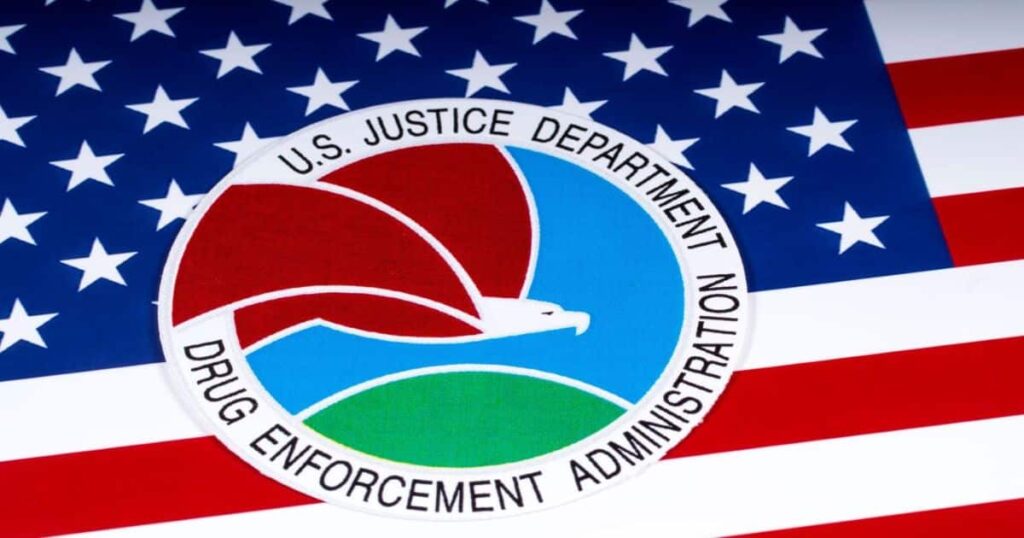The U.S. Drug Enforcement Administration (DEA) has clarified the definition of THC in the context of industrial hemp, potentially placing greater restrictions on intoxicating products derived from hemp compounds, according to a letter issued by the agency.
The 2018 Farm Bill defined hemp as cannabis with less than 0.3% delta-9 THC. The DEA’s clarification says the threshold includes not only delta-9 THC but also also THCA, a precursor to THC that is present in hemp and which, when heated, converts into delta-9.
The DEA letter, from Terrence Boos, chief of the agency’s drug and chemical evaluation section, adds fuel to efforts to crack down on hemp-derived intoxicants – products that were not envisioned by lawmakers when they wrote the landmark 2018 agriculture legislation that decriminalized industrial hemp.
THCA & the CSA
The Boos letter comes as proposed provisions have been inserted into the next U.S. Farm Bill — due later this year or early next — that would curtail products containing the unregulated, high-producing substances. Those draft rules would clarify that THCA and similar compounds such as delta-8 THC, delta-10 THC, THC-O-acetate, HHC, THCP and others, which can be synthetically boosted in the lab to produce psychoactive effects, are illegal.
“For the purposes of enforcing the hemp definition (in the original 2018 Farm Bill), the delta-9 THC level must account for any . . . THCA,” Boos wrote in the letter, underscoring that “THCA does not meet the definition of hemp under the CSA (Controlled Substances Act) because upon conversion for identification purposes as required by Congress, it is equivalent to delta-9-THC.” The CSA is the federal drug law that classifies substances based on medical use and abuse potential.
The Boos letter was in response to a request for comment on THCA from Shane Pennington, a cannabis attorney at the Columbus, Ohio-based Porter Wright law firm.
Red herring
Stakeholders – introducing a red herring – say they worry that lumping delta-9 THC and THCA together could push many hemp crops beyond the 0.3% limit, affecting not only growers who produce flowers for CBD but also those who farm hemp for fiber and grain.
But that would seem to be a possibility only in hemp varieties bred specifically to produce higher levels of THCA because most conventional hemp cultivars contain negligible amounts of the compound. The European Union, which has a much longer modern hemp history than the U.S., regulates the combined level of delta-9 THC and THCA, expressed as a total THC value, also under a 0.3% limit.
Boos said last year DEA’s position is that THCA and synthetic cannabinoids from hemp should be considered banned, and that the agency is in the process of developing a final rule to formally clarify that policy, based on recommendations from the U.S. Department of Health and Human Services.
Farm Bill loophole
The 2018 U.S. Farm Bill legalized industrial hemp as “any part of that plant, including the seeds thereof and all derivatives, extracts, cannabinoids, isomers, acids, salts, and salts of isomers,” with no more than a 0.3% THC content. But the legislation did not anticipate the emergence of products that include high levels of THCA and other intoxicants made from the hemp plant’s flowers.
After the market for over-the-counter CBD extract health aids boomed and then busted beginning in 2019, companies left holding backlog CBD stocks started selling them to the dodgy producers of the psychoactive compounds, most of which are made from CBD base material.
The U.S. Food & Drug Administration (FDA) has repeatedly warned consumers about hemp-derived intoxicants, noting that the unregulated and often unsafe products – widely available and often targeted to youth – may contain harmful chemicals. States continue to address the substances in the absence of federal rules, either banning them or putting them under regulations for marijuana.

